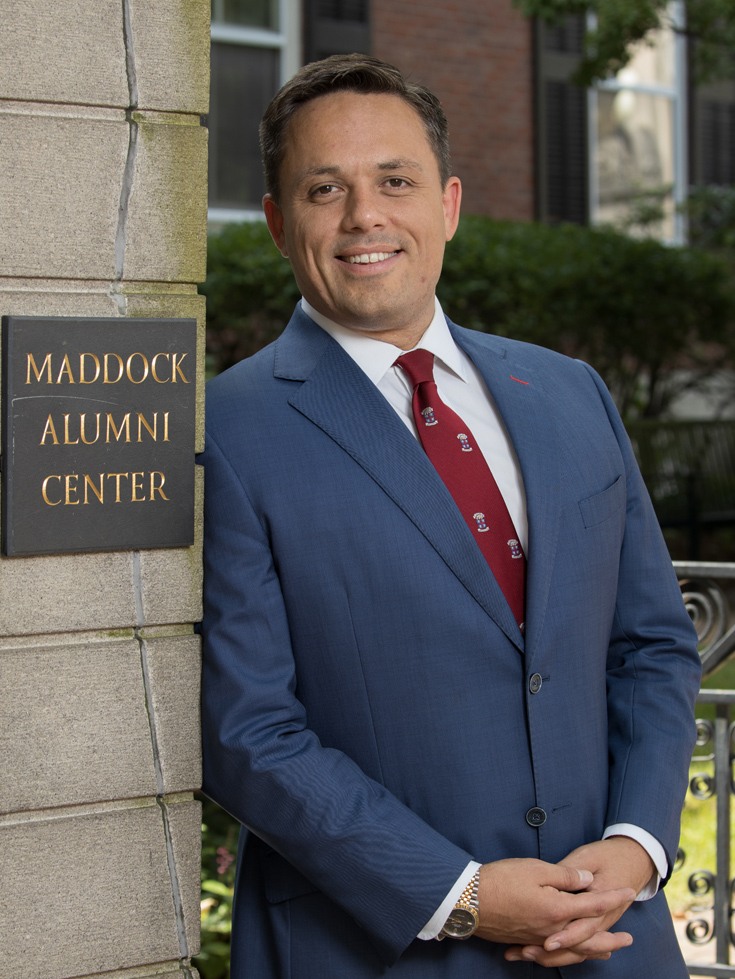Carlos Lejnieks has spent a lifetime shaping his style of leadership.
His mother's strong work ethic as she struggled to put food on the table made a powerful first impression. Caring individuals who advised him to graduate from high school and pursue further education rather than an early entrepreneurial career instilled in him an appreciation for mentorship. A college letter of recommendation from a baseball legend and a handwritten note from a Brown admission officer showed him the value of lasting friendships and of the personal touch. And Brown’s pre-orientation Third World Transition Program—during which incoming students are invited to discuss social identities and consider their own histories—conveyed to him the power of community.
“Initially I wasn’t sure whether I was going to stay or transfer,” Lejnieks remembers. “When I made intentional connections and took advantage of the University’s advisory systems, the question was removed from my mind. I felt that my story could be part of Brown’s story. Everything suddenly became manageable.”
Lejnieks barely had time to get his feet under him when the then-president of Brown’s Undergraduate Council of Students sought him out and encouraged him to run for a position on the council. Victorious, Lejnieks—a self-avowed “observer of leadership”—put into practice some of what he had learned about the value of hard work, mentorship, personal connections, and community. “When something feels inclusive when receiving it,” he says, “why not also give it?”
And he has.
“I still felt uncertain about some aspects of the world when I graduated,” says Lejnieks. But volunteerism was never questioned. “It is cemented in the Brown ethos that everyone does their part.”
His volunteerism eventually led him to become chair of the Brown Alumni Association (BAA)’s Multicultural Alumni Committee in 2019 and the first Latinx president of the BAA in 2021. There, his style of leadership served him well, and he aimed it at ensuring that all members of the alumni community felt included, supported and connected by the programming created by the BAA and Alumni Relations. “To me, it seemed critically important that all voices were seen as part of the whole.”
The timing was auspicious. The University-wide Diversity and Inclusion Action Plan—an ambitious plan seeking to achieve the highest level of academic excellence by building a fully diverse, inclusive, and equitable Brown—had been launched in 2016. As part of an honest self-assessment, the University had been engaged for three years in taking concrete steps to transform the policies, structures and practices that historically led to the exclusion of some members of the community.
Starting in 2019, Lejnieks and Mary Ward, senior director for alumni belonging in Alumni Relations, partnered in spearheading Brown’s first-ever Historically Underrepresented Groups Alumni Engagement survey geared toward issues impacting those alumni. Taking on this task “was her strength; her wheelhouse,” he asserts.
Ward worked closely with Multicultural Alumni Committee members to ensure that the survey questions would not only touch on broad alumni engagement but also garner feedback on their experiences in terms of diversity, inclusion, and belonging at Brown. While she concentrated on designing and implementing the survey and long-term strategic roadmap, Lejnieks did what he does best: community- and relationship-building. He reached out to Eldridge Gilbert III ’05, then president-elect of the Inman Page Black Alumni Council (IPC), as well as to every other affinity group leader.
“The first time that Carlos reached out to me was when he wanted help in increasing the participation of Black alumni in the Brown Alumni Association survey,” says Gilbert. “His recognition that some alumni might respond differently to requests for participation from their affinity groups versus a general BAA communication was deeply appreciated. It demonstrated Carlos’s awareness of the variety of experiences and relationships that alumni have to the University and a desire to shift that.”
The result? Ward shares that “the responses that the questions generated gave us a deep understanding of the experiences, needs, and interests of our diverse and historically underrepresented communities."
And “we heard that Brown wasn’t perfect,” says Lejnieks. “But even some alumni who had bad experiences wanted to connect, to be part of the whole. They still were committed to being a part of the journey.”
Engaging in an ongoing dialogue with members of Brown’s various affinity groups is increasing their support of and involvement in the University’s overall goals and efforts. It is also vital to Brown, and has been built into the goals of the Diversity, Equity, Inclusion, and Belonging (DEIB) Plan in Alumni Programming. These goals guide the BAA Board of Governors and the Office of Alumni Relations in supporting the University’s diverse communities.
“Our work in the Office of Alumni Relations is anchored in a desire to help every member of our Brown alumni community know and feel that they belong,” says Zack Langway ’09, vice president for alumni relations. “We know that representation of a wide spectrum of experiences and perspectives is important to fostering a vibrant community, but that feeling seen, respected, and loved is what helps people feel a sense of belonging. In Carlos, we’ve been fortunate to have an incredible alumni champion and partner, and I am thankful to him and the many alumni and staff whose work in this area reflects deeply held Brown values.”
These values were apparent in the first steps Lejnieks took when he became president of the BAA. Although the BAA Board of Governors had alumni affiliated with affinity group communities on the board, Lejnieks recognized the need to ensure that board membership included a current leader from each affinity group community. Lejnieks championed the board's move to revise the BAA's bylaws to establish a full board seat for each of the BAA-supported affinity groups.
